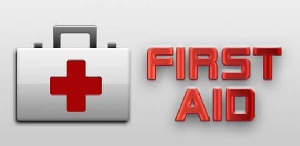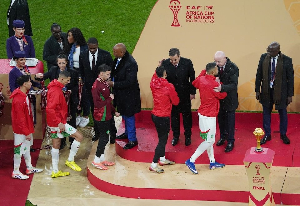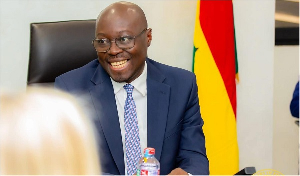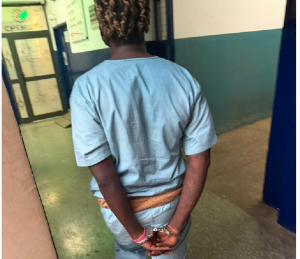It was a fateful Saturday afternoon; my dad had gathered the family around to spend some quality time off his busy life with us. He said he had been absent from the family and was ready to make it up to us with dedicated family time over the weekends. We were chatting and laughing at his hilarious jokes when suddenly he held his chest in pain and dropped to the ground. My father suddenly became breathless; gasping for air like a fish will do when taken out of water, with several beads of sweat lining his forehead. My Mum started shouting, as you would expect in most homes in our Ghanaian society.
I became frightened and helpless, the first boy of the family at about nineteen years at the time – I knew I had to do something for my two other siblings could do but nothing to help the situation. By the time we finished arranging for transportation to take my father to the hospital, his condition had worsened – he was now vomiting and almost unarousable with some noisy breathing. When we got to the hospital, I saw the nurses and doctors ran up and about, trying their best to save him. They later came to tell my mother the sequence of events they went through to get my father stabilized but then they concluded with their popular phrase, ‘’we are sorry but we lost him’’.
I asked the Doctor why they couldn’t bring back my father to life and the explanations he offered were reassuring but regrettable. Regrettable because my father as I was told had suffered a heart attack and he could have been revived with a simple and easy to perform procedure called Cardio-Pulmonary Resuscitation (CPR). The Doctor also explained that my father had aspirated some of his vomitus into the lungs and choked on that, hastening his demise. I later learnt that if I had placed my father in the recovery position during the time that he was vomiting in that unarousable state, most or all of the vomitus would have come out and he wouldn’t have suffocated on them. Were my father and I including my Mum victims of an unfortunate but salvageable situation? Of course yes.
I remember a story read on the news a while back about a lady who found the man she was making love with having a heart attack and subsequently dying. This lady according to the news was found guilty of murder and sentenced to jail. Had she known how to perform CPR, the story and her life thereafter would have been different. This discussion on the relevance of CPR is not far-fetched. In fact, a 2014 publication in the popular international research library, Pubmed by some Ghanaian researchers suggested that Cardio-Vascular (heart related) deaths accounted for more than one-fifth (22.2%) of all causes of deaths from autopsy cases at the Korle-Bu Teaching Hospital within a five year period (2006- 2010).
These deaths they claimed rose steeply in mid-life (45 – 65 years) reaching a peak in the very old. The Ghana Medical Association in another communiqué released during its 58th Annual General Conference in October raised the concern about sudden deaths related to heart attacks and other heart diseases claiming that “it is the number one cause of death in sub-Saharan Africa in adults over the age of 30”. So this discussion on the increasing sudden deaths in the country is not going to take an abeyance. And something must be done for we cannot look on helplessly on a daily basis as people become victims of such unheralded deaths. Death they say is inevitable and we will all die one day but I get comfort in that assurance that though death will come one day, most of the days we will live. Can this analogy be true for everyone? Definitely not! For some, one day they’re normal, the next they’re different; they don’t know what changed but they realize suddenly that every aching bone is bleeding out and they can themselves crossing over to the other side in pain. In pain for how gruesome they had to leave earth, for how helpless they had become on the spur of the moment though there were people who could have helped them out of their misery had they been endowed with some simple life saving techniques.
I speak of the increasing precious lives lost through Road Traffic Accidents. The just ended year 2017 saw a total of 2,076 human beings perishing in road accidents and this number is just eight people less than the 2,084 people killed in the preceding year 2016. The statistics is becoming overwhelmingly frightening as the first quarter of 2018 only had 336 deaths from 2095 accidents. Will accidents cease from occurring? I am afraid it will rather continue to claim lives from the increasing commercialization of our livelihood and the busyness of our daily lives in the technology driven world where people cross highways while pressing on their phones. People must apply caution when using the road as drivers or pedestrians but in the unfortunate event that an accident occurs, there must be something that one can do to save another’s life so that a father who left home to get dinner for the family can safely return. And this is where First Aid interventions like arresting bleeding, bandaging and performing lifesaving CPR come in.
In a country like Ghana where there is one functional ambulance to every 527,272 citizens, the ambulance service however equipped cannot be confidently relied on to be available for immediate intervention in saving lives. It is victims of accidents with minor injuries and on-lookers who can take over and help their mothers, sisters, cousins or even strangers fight for their lives as they are bleeding out profusely or gasping for dear breath to live.
The skills for doing these have to be learnt from professionals as even mishandling of victims can cause more harm than good and when acquired can come in handy one day when one least expects. Deaths and disabilities from accidents continue to increase in Ghana and domestic ones are not exceptions. Children are especially vulnerable here because of their curious nature. In the Komfo Anokye hospital in Kumasi alone it is reported that there was a total of 253 children admitted for various forms of accidental poisoning including caustic soda, medication and weedicide poisoning from which kerosene was the leading cause accounting for 39.5% in a research done from 2007 to 2012.
Unfortunately, the drinking of these poisons is not only the problem but the crude interventions carried out are what worsen the whole situation. In most instances, children suspected to have taken kerosene for example are given palm oil to induce vomiting. This is very dangerous because, vomiting is an exercise that is not well coordinated and controlled by the body’s reflexes and one can get some of the vomitus into the airway and be choked on them. Also, kerosene by nature is volatile and can evaporate so trying to bring it out in vomiting can get some of it evaporated and escape into the airways causing breathing problems.
A sad story is told of a couple who lost 3 children including nine-month old twin girls in a news publication in April this year. The children had apparently ingested a fumigation tablet for the control of insects in the house. They were later found having difficulty breathing with convulsion and rushed to the hospital but did not survive.
First Aid seeks to educate and empower people to take simple steps using resources available to undertake lifesaving interventions while arranging to send people to the hospital. Accidents and injuries from cuts occur on a daily basis but people lack the basic skills to perform to immediately provide temporary relieve before visiting the hospital. The International Federation of the Red Cross and Red Crescent (IFRC) recommends that every household has at least one person with a First Aid skill. First Aid is a must learn skill for every individual.
The Red Cross and the Red Crescent societies are the international bodies globally recognized to provide First Aid training programmes for individuals. The Ghana Red Cross Society and the Iran Clinic, a member of the Iranian Red Crescent are the institutions providing First Aid trainings in Ghana. Contact these institutions and learn a skill in saving lives today. The author is a Clinician and a First Aid Instructor. He has undertaken several extensive trainings for First Aid Instructors and First Aid volunteers in Ghana.
By: Richmond Larweh
Opinions of Wednesday, 28 November 2018
Columnist: Richmond Larweh















